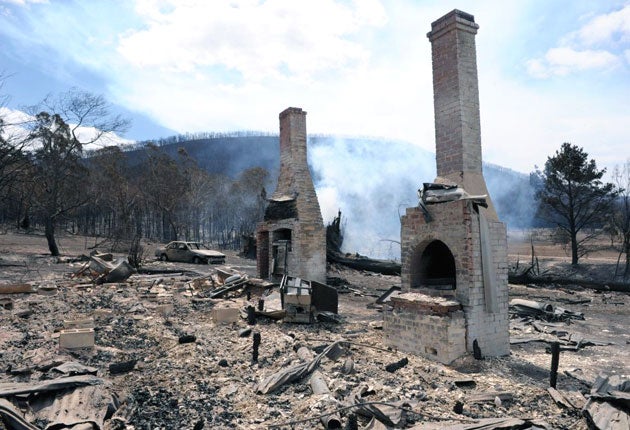Just smoke, ashes and grieving where once an Australian paradise stood
Those lucky enough to survive the firestorm contemplate their losses

High winds whistled through Wandong yesterday, whipping ash into the eyes of Draga Kovacic as she surveyed the blackened ruins of her home for the past 25 years. "Burnt, all burnt," she wept, tightly clutching her grandson. "We have lost everything. All I've got left is these clothes I'm wearing."
The small town nestled in bush north of Melbourne was one of the first places hit by the monstrous fires that roared across Victoria at the weekend. At least four people died in Wandong and many homes were reduced to charred hulks. Yesterday, the sickly-sweet smell of smoke hung in the air.
As the death toll from Australia's worst bushfires rose to 181, police were closing in on arsonists suspected of starting some of the blazes. They believe they know the identity of a man allegedly responsible for one of the biggest fires, and may release a photofit in coming days.
For Mrs Kovacic and her husband, Drago, such developments are academic. All that registers is the scale of their loss. The elderly couple, originally from Croatia, had built a sizeable house in Wandong, planting 200 fruit trees. They kept chickens. All that remains of their orchard is twisted black stumps. The chickens are gone.
After fleeing their home just in time, the couple returned to find it obliterated. "This was their whole life, their dream, everything they'd worked for," said their son, Vlado Kovacic. Drago, a neat man of 74, tapped his breast with his fist. "It hurts me here," he said. "My heart is breaking."
Down the road is a chaotic mess of rubble and broken glass, the remains of a once handsome dwelling. Inside, there is little to be seen: a fridge, television and sofa all lie burnt and smashed in the wreckage. The garden is littered with broken stone urns and angels; the fishpond is ankle-deep in ash. A garage door flaps uselessly on its hinges.
There are similar scenes in communities all over the disaster zone, which comprises 20 or so hamlets and townships dotted across a broad arc of forested and agricultural land. And everywhere there is evidence of the fury of the firestorm. The cinder-black landscape still smoulders in patches. The remains of kangaroos, incinerated in mid-escape, lay across the north-south highway. Metal road signs have become blobs on the pavement.
In the town of Whittlesea, where an emergency relief centre has been set up, bushfire victims exchange tales of survival and bereavement. As volunteers serve up continous cups of tea, the locals cling to each other and weep. Their minds are filled with images they wish they had never seen.
Roger Cook calls himself a working-class boy from Portsmouth. He has lived in Kinglake West, in the Upper Yarra Valley, for 20 years. His street, Pine Ridge Road, borders a national park. "That's what we love about it," he said. "You're in a little suburban street, but you've got lyre birds and wombats and beautiful bushland." There were 47 houses on Pine Ridge Road, and fire destroyed them all. Dozens of lives were lost in the Kinglake area. Mr Cook believes 21 people died in his street. He counts them off on his fingers. "There's a single mother with two kids, there's an old lady, there's a family with two young kids."
His own family left just in time. "A few more minutes, and we'd have been trapped," he said. Three men he knows stayed until houses around them were virtually exploding. By that time, their four-wheel drive was on fire, and their other car was so hot that the gearstick was melting. "One bloke had to sit in another's lap because the seats were melting, but they managed to drive it," said Mr Cook. "They were probably the last ones alive in the town. They said they heard screaming as they left."
Inside the volunteer fire service headquarters in Whittlesea, an exhausted John Holmes was gulping down dinner after a 12-hour shift. He had spent the day in Kinglake, which he called "Armageddon". "Everything there is grey and black," he said. "If it's still standing, it's black; if it's not, it's ash."
One of the most haunting sights, he recalled, was cattle that had been burnt as they sat in the fields. The inferno had roared through so swiftly, they had not even had time to get up. Another firefighter, David Tree, had rescued a koala he saw moving gingerly on scorched paws across the burnt countryside.
It stopped when it noticed him following, and he called out to his colleagues for water. "I unscrewed the bottle, tipped it up on his lips and he just took it naturally," Mr Tree said. "He kept reaching for the bottle, almost like a baby."
Join our commenting forum
Join thought-provoking conversations, follow other Independent readers and see their replies
Comments